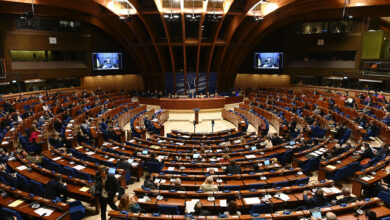In place for 31 years, a state of emergency that gives broad and unchecked powers to Egypt’s police force will end at the stroke of midnight today. It is being hailed as a small victory among human rights defenders that have long campaigned for its end, and was one of the demands of the 25 January revolution.
"At a very gloomy time, this is a slither of good news, because the human rights community has called for decades against the Emergency Law," said Heba Morayef, the Cairo-based Middle East and North Africa researcher at Human Rights Watch (HRW).
As the revolution’s first-round of presidential elections produced results deemed disappointing by revolutionaries last week — as one of the run-off candidates is a senior figure of the former regime and could mean a setback of the country’s sacrifices over the last year and a half — an end to the state of emergency is seen as one step forward.
"It’s a historical day for someone like me, who has never lived in Egypt without the Emergency Law. It suspends all rights and freedoms and gives broad powers to security and state agencies to create exceptions to normal laws and freedoms guaranteed by the constitution," said Magda Boutros, criminal justice director at the Egyptian Initiative for Personal Rights.
The state of emergency and accompanying law came to symbolize the excessive powers of deposed president Hosni Mubarak’s widespread and notorious police force. It was used for the suppression of political dissent and became associated with torture and other human rights abuses.
"For the first time in my lifetime, we can start hoping for the rule of law to be applied; there will be no more leeway for security agencies to arbitrarily arrest individuals," Boutros said.
From tomorrow, there will also be no more referrals to the Emergency State Security Courts (ESSC), in which detainees are not given a fair trial by judges directly appointed by the president.
A state of emergency can only be reinstated with the majority consent of Parliament, whose members are 75 percent Islamist. The Muslim Brotherhood and to a lesser extent Salafis were the primary targets of arbitrary police arrests under Mubarak, and so their motivation for reinstating it and giving wide powers to the Interior Ministry is slim.
"The Brotherhood were the primary campaigners in the May 2010 demonstrations against the Emergency Law and torture, so implementing it would be hard to sell to their constituency," Morayef said.
The Muslim Brotherhood’s Freedom and Justice party paper had a three-quarter page spread today offering reassuring analysis that Egypt’s security can still be maintained without the state of emergency in place.
It explains that 99 percent of its use was mainly to suppress political opposition and freedom of expression, especially by Islamists, and the remaining 1 percent to tackle drugs-use and terrorism, though the latter was its stated purpose.
Despite this victory, Parliament still needs to pass a law that will force the Interior Ministry to release all Emergency Law detainees, or refer them to prosecutors to be charged, and ask the public prosecutor to transfer all ESSC trials to regular civilian courts, said a statement released on 30 May by HRW and advocacy group Alkarama.
The Interior Ministry is currently detaining at least 188 people under the Emergency Law, the two advocacy groups estimate. Some of those detained remain in prison for activities not even illegal under Egyptian law, such as the possession of beer, Alkarama has documented.
The public prosecutor referred at least six new cases throughout 2011 and 2012 to the ESCC courts, and at least eight cases are still being heard, such as the September 2011 Israeli embassy attack.
Reforming the laws under which police operate is another victory yet to be achieved, according to Malek Adly, a human rights lawyer with the Hisham Mubarak Law Center.
"The laws that permit police use of firearms and live ammunition to disperse demonstrations and sit-insare still in place and do not change by lifting the state of emergency," Adly told Egypt Independent, though he also hailed the event as an important achievement.
The laws that have allowed the army to try 12,000 civilians in military courts since taking over law February are also still in place and not affected by the lifting of the state of emergency.
"If a civilian commits a crime against a military building, military factory, or in a military area, she or he can still be referred to a military court and tried under military justice law," Boutros explained.
Throughout the transitional period, the Emergency Law has not been the army’s method of trying civilians; they have used the military code of justice instead, Morayef explained.
And while internal law enforcement is the domain of the police under the Interior Ministry, the army will still retain a role in domestic security, particularly if the former is incapable of doing so, explains Judge Tahany al-Gibaly, deputy head of the Supreme Constitutional Court, in privately-owned Al-Shorouk newspaper today.
This will particularly be the case in the next few weeks when army security will be used for law enforcement during Mubarak’s trial on Saturday and the second round of the presidential election in mid-June, Gibaly said.
Emergency Law has a long history in Egypt and dates back to the British administrative period in the early twentieth century. It was then called Martial Law and introduced in 1914 at the start of World War I, which allowed use of emergency courts. It was also used during World War II, and from 1943 to 1950 when Egyptian forces entered Palestine. It has been used on and off since then, Al-Shorouk reports today.
Egypt’s constitutions refer to situations in which a State of Emergency can be applied. Article 45 of the 1923 Constitution states that when the King wants to apply Martial Law, he must refer it to Parliament, which will then decide whether to continue or cancel it. If Parliament is not in session, it must convene immediately to make this decision.
During former President Gamal Abdel Nasser’s tenure, its name was changed and referred to in the 1956 Constitution for the first time as a state of emergency. In this constitution, Parliament has 15 days to decide on whether or not to maintain the law, if in session, and if not then it will make its decision when it reconvenes. Article 127 of the 1964 Constitution extends Parliament’s decision period to 30 days. The 1971 Constitution brings this decision-making time back down to 15 days, and says that the state of emergency can only be extended with Parliament’s consent.
Former President Anwar Sadat’s assassination in October 1981 marked the start of the state of emergency’s renewal every year.




